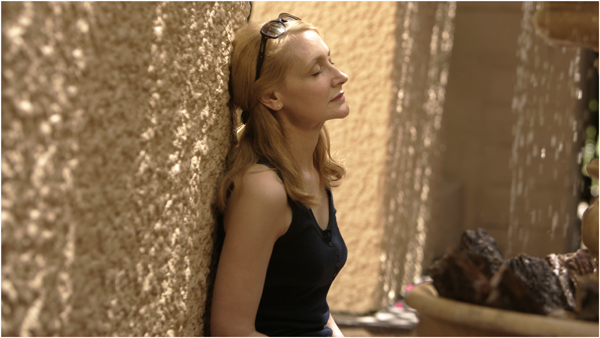|
Reviews of Recent Independent, Foreign, & Documentary Films in Theaters and DVD/Home Video

CAIRO TIME Cairo Time is a film that demonstrates the value of pace. Slow, long, lingering shots of the Egyptian allow you to sink into the movie until you feel just as languorous as the characters. As the light glows warmer and warmer and the necklines scoop lower and lower, a honeyed sensuality seeps onto the screen until it seems only natural that two opposites attract. The two opposites in this case are Juliette (Patricia Clarkson), an American magazine editor and wife, and Tareq (Alexander Siddig), an Egyptian coffee house owner and former UN security official. Tareq takes charge of Juliette after her husband, Mark (Tom McCamus), a UN diplomat, is delayed from meeting her in Cairo due to conflict in a Gaza refugee camp. Somewhat lonely and suffering from empty nest syndrome (with two children grown and out of college), Juliette wanders the streets, with Tareq playing the gracious tour guide. That these two former acquaintances find their relationship develops into something more is both unexpected as it’s unsought, though not necessarily unwelcome. Clarkson imbues Juliette with a sort of graceful lassitude. Every movement seems almost as an afterthought. Confronted by the Egyptian heat, she slowly becomes adrift. The culture shock she receives as a woman alone, with hair uncovered, seems to baffle more than frighten her. Though her one decisive act (to reach her husband in the Gaza Strip) has political and potentially dangerous ramifications, for the most part she’s content to sit back and let Cairo take her where it will. That Cairo takes the form of Tareq is not a hardship any woman would find difficult. In this lifelong bachelor (played with quiet dignity and humor by Siddig), Juliette finds more than just a companion to help her navigate the city streets. Their conversations are almost courtly, with an easy chemistry that soon develops into a deeper connection. When Tareq tells Juliette “Late at night, I often watch TV, when I cannot sleep,” it feels more intimate than the most heartfelt confessions. Western
women losing their inhibitions and becoming immersed in Eastern culture
is not a new story, but writer/director Ruba Nadda refuses to let
her characters become stereotypes. This is no grand love affair a la
The English Patient. Instead, it’s something quieter, and
much more moving. Juliette and Tareq meet mundanely—they part mundanely.
There are no remonstrations, tears, or revelations when Mark finally
returns to his wife. Instead there is only a spare, slightly graying man
watching the woman he loves walk away. The wistfulness in Tareq’s glance
resonates with more pain than any dramatic outburst.
Lisa Bernier
|

